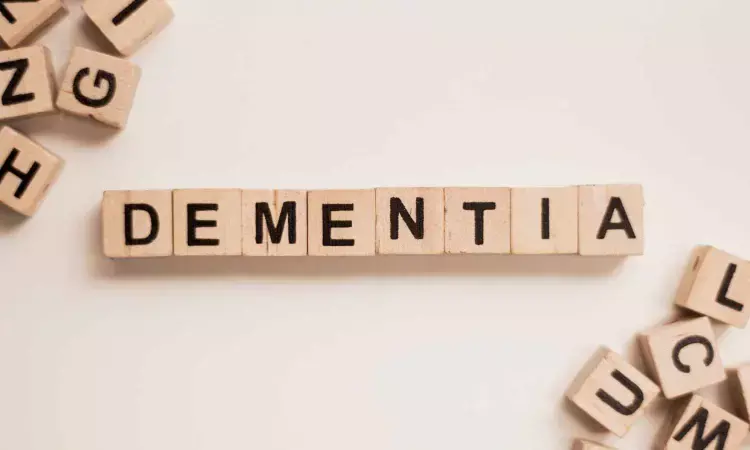- Home
- Medical news & Guidelines
- Anesthesiology
- Cardiology and CTVS
- Critical Care
- Dentistry
- Dermatology
- Diabetes and Endocrinology
- ENT
- Gastroenterology
- Medicine
- Nephrology
- Neurology
- Obstretics-Gynaecology
- Oncology
- Ophthalmology
- Orthopaedics
- Pediatrics-Neonatology
- Psychiatry
- Pulmonology
- Radiology
- Surgery
- Urology
- Laboratory Medicine
- Diet
- Nursing
- Paramedical
- Physiotherapy
- Health news
- Fact Check
- Bone Health Fact Check
- Brain Health Fact Check
- Cancer Related Fact Check
- Child Care Fact Check
- Dental and oral health fact check
- Diabetes and metabolic health fact check
- Diet and Nutrition Fact Check
- Eye and ENT Care Fact Check
- Fitness fact check
- Gut health fact check
- Heart health fact check
- Kidney health fact check
- Medical education fact check
- Men's health fact check
- Respiratory fact check
- Skin and hair care fact check
- Vaccine and Immunization fact check
- Women's health fact check
- AYUSH
- State News
- Andaman and Nicobar Islands
- Andhra Pradesh
- Arunachal Pradesh
- Assam
- Bihar
- Chandigarh
- Chattisgarh
- Dadra and Nagar Haveli
- Daman and Diu
- Delhi
- Goa
- Gujarat
- Haryana
- Himachal Pradesh
- Jammu & Kashmir
- Jharkhand
- Karnataka
- Kerala
- Ladakh
- Lakshadweep
- Madhya Pradesh
- Maharashtra
- Manipur
- Meghalaya
- Mizoram
- Nagaland
- Odisha
- Puducherry
- Punjab
- Rajasthan
- Sikkim
- Tamil Nadu
- Telangana
- Tripura
- Uttar Pradesh
- Uttrakhand
- West Bengal
- Medical Education
- Industry
Being social may delay dementia onset by five years, reports research

Visiting friends, attending parties and going to church may help keep your brain healthy, according to research conducted at Rush.
The study, posted online in Alzheimer's & Dementia: The Journal of the Alzheimer's Association, shows that frequent social activity may help to prevent or delay dementia in old age.
“This study is a follow up on previous papers from our group showing that social activity is related to less cognitive decline in older adults,” said Bryan James, PhD, associate professor of internal medicine at Rush.
“In this study, we show that social activity is associated with an increased risk of developing dementia and mild cognitive impairment, and that the least socially active older adults developed dementia an average of five years before the most socially active.”
Social activity can strengthen neural circuits in the brain, making them more resistant to the buildup of pathology that occurs with age. Social behavior activates the same areas of the brain involved in thinking and memory.
Authors note that the findings highlight the value of social activity as a possible community-level intervention for reducing dementia.
The findings suggest that more frequent social activity points to a 38% reduction in dementia risk and a 21% reduction in mild cognitive impairment risk, compared to the least socially active.
In addition, a five-year delay in dementia onset has been estimated to yield an additional three years of life and an economic benefit of reducing dementia costs by 40% in the next 30 years, potentially $500,000 in lifetime health care savings for each person who would eventually develop dementia.
The study included 1,923 dementia-free older adults with a mean age of about 80 who are participating in the Rush Memory and Aging Project, an ongoing longitudinal study of common chronic conditions of aging.
A total of 545 participants developed dementia, and 695 developed mild cognitive impairment. They each underwent yearly evaluations that included a medical history and neuropsychological tests.
Social activity was measured based on a questionnaire that asked participants whether, and how often, in the previous year they had engaged in six common social activities that involve social interaction-for example, whether they went to restaurants or sporting events, played bingo, took day or overnight trips, did volunteer work or visited relatives or friends.
Cognitive function was assessed using 21 tests for various types of memory as well as perceptual speed and visuospatial ability.
At the start of the investigation, all participants were free of any signs of cognitive impairment. Over an average of five years, however, those who were more socially active showed reduced rates of dementia. Other variables that might have accounted for the increase in cognitive decline-such as age, physical exercise and health-were all adjusted for in the analysis.
Why social activity plays a role in the development of cognitive problems is not clear. One possibility is that “social activity challenges older adults to participate in complex interpersonal exchanges, which could promote or maintain efficient neural networks in a case of ‘use it or lose it,’” James said.
Future research is needed to determine whether interventions aimed at increasing late-life social activity can play a part in delaying or preventing cognitive decline, James said.
Reference:
Chen Y, Grodstein F, Capuano AW, Wang T, Bennett DA, James BD. Late-life social activity and subsequent risk of dementia and mild cognitive impairment. Alzheimers Dement. 2025 Jan;21(1):e14316. doi: 10.1002/alz.14316.
Dr Kamal Kant Kohli-MBBS, DTCD- a chest specialist with more than 30 years of practice and a flair for writing clinical articles, Dr Kamal Kant Kohli joined Medical Dialogues as a Chief Editor of Medical News. Besides writing articles, as an editor, he proofreads and verifies all the medical content published on Medical Dialogues including those coming from journals, studies,medical conferences,guidelines etc. Email: drkohli@medicaldialogues.in. Contact no. 011-43720751


